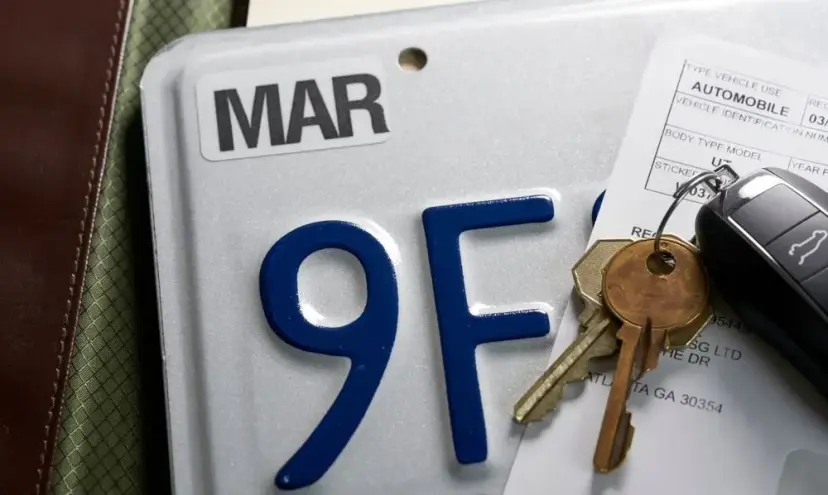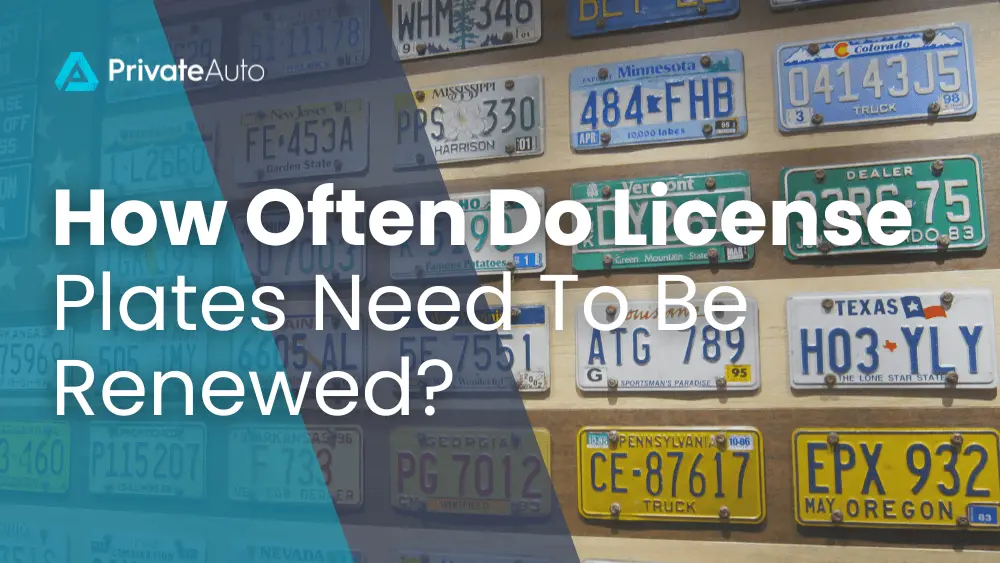To further complicate matters, some states don’t even have a consistent license plate renewal schedule for all types of plates. States often have different schedules for standard license plates versus specialty or personalized license plates. This article will cover standard license plate renewal, but if you have personalized or specialty plates, your state may have a different schedule. Make sure to check with your state’s DMV.
Let’s get into the details of renewing your standard plates.

Do all states require license plate renewal?
Do All States Require License Plate Renewal?
49 US states require license plates to be renewed. Delaware is the only state with permanent or non-expiring license plates for standard passenger vehicles.

Renewal practices vary across the country, with some states opting for annual renewals and others opting for a biennial (every two years) renewal cycle.
Let’s explore which states fall into each category.
States that require annual renewal
States That Require Annual Renewal for Standard Passenger Plates
Out of the 49 states that require license plate renewal, 37 mandate annual renewal.

13 states have a biennial renewal schedule for standard license plates:
- District of Columbia
- Kansas
- Massachusetts
- Mississippi
- New Hampshire
- New York
- North Carolina
- Ohio
- Oregon
- Rhode Island
- Vermont
- Washington
- West Virginia
Inconsistent State Renewal Schedules
In some states, there are different renewal schedules for specialty or personalized license plates than for standard plates.
For instance, Massachusetts has some specialty plate designs that need to be renewed annually and other designs that are renewed biannually:
Annual renewal:
- Antique
- Antique Vanity
- Ham Radio Operator
Biennial renewal:
- Fish & Wildlife
- Patriots
- United We Stand
To avoid any fees or issues, it’s important to consult your state’s DMV or relevant authorities to understand the renewal requirements for these types of plates in your state.
License plate renewal forms
License Plate Renewal Forms
Each state has its own form to initiate the renewal. Use the correct form for the state in which the car is registered.
Here are a few examples of official state request forms:
- Missouri: application for motor vehicle license (Form 184)
- New York: vehicle registration/title application (Form MV-82)
- Oregon: application for registration, renewal, replacement or transfer of plates and/or sticker (Form 735-268)
Most states make their forms available for download as PDFs. They’re usually formatted so that you can fill them out on your computer or device before you print them. You can usually find your state’s form by Googling your state’s name plus “license plate renewal form.” If that fails, contact your state’s DMV information center and ask them where you can find the form.
License plate renewal fee
License Plates Renewal Fees
When renewing your license plates, you will have to pay a fee based on the type of plates you have. Typically, personalized and specialty license plates have a higher renewal fee than standard plates.

License plate renewal fees also vary considerably from one state to the next. Here are a few examples.
- Alaska: $30
- Georgia: $20
- Virginia: $40
- New York: $30
Read our complete guide to license plate costs to understand more.
License plates renewal cycles
Understanding the License Plates Renewal Cycles
Let’s look closer at the distinctions between annual and biennial renewals.
Annual License Plate Renewal
- Proof of car insurance
- Emissions testing results (if applicable)
- Proof of identification (drivers license, ID cards, passports)
To avoid penalties or issues,you should stay informed about your state’s specific requirements for annual license plate renewal and renew your plates on time.
States that require biennial renewal
Biennial License Plate Renewal
Biennial license plate renewal is the process of renewing vehicle license plates every two years. Don’t confuse “biennial” with “biannual,” which means “twice per year.”
In states with a biennial renewal requirement, vehicle owners are required to renew their license plates prior to a specified date every two years to keep their vehicle’s registration status active. This process includes submitting the required documentation and ID information, paying any applicable fees, and getting a new license plate sticker for the new registration period.
Renewal notice
Renewal Reminders
Vehicle license plate renewal is a carefully coordinated routine between state agencies and vehicle owners, set to a calendar of deadlines. Each state’s Department of Motor Vehicles (or equivalent motor vehicle registry body) has its own system for assigning these deadlines.
Hawaii and Nebraska, for example, have implemented a birthday-based renewal system, with registration deadlines falling in the owner’s birth month.
Meanwhile, states such as Montana and Texas have chosen to go the alphabetical route, determining renewal periods based on the first letter of the owner’s last name.
Other states, such as Utah, assign a renewal deadline for the end of the month in which a vehicle was initially renewed.
In all cases, DMVs try to spread out renewals over the course of the year so there isn’t a backup.
How Can I Find Out When My License Plate Renewal is Due?
Here are a few reminders to help you stay on track:
- Registration document: The expiration date is typically shown on your vehicle’s registration document. Keeping an eye on this document can help you remember when it’s time to renew.
- Renewal notice: most states’ DMV or similar agencies send out a renewal notice several weeks before your license plate and registration are due to expire. This notice, often arriving via postal mail or email, usually includes information on the renewal deadline and associated fees. For example, in Ohio, you receive a renewal notice about 45 days before your license plate expires.
- License plate or windshield sticker: some states use stickers on the license plate or windshield to display the expiration date of your plates. For instance, in Texas, once you renew your license plates, you’re given a sticker to place on your windshield showing the month and year of expiration.
- Online DMV records: many DMVs have online systems where you can check on the status of your vehicle registration. These can be especially helpful if you’ve lost your registration document or haven’t gotten a notice that your registration is about to expire.
Sell Your Car on PrivateAuto
We are the only transactional marketplace where you can buy and sell used cars hassle-free while completing the whole transaction right within our app.

Our technology-driven, self-service solution makes it easy and safe to communicate, e-sign state documents, and send or receive payments instantly and securely. You can also set up test drives and talk about the price without giving out any personal information.
Plate Renewal Frequently Asked Questions
Can I renew my plate online in Wisconsin?
In Wisconsin, you can renew online using a MasterCard, American Express, Visa, or Discover credit card or debit card and an ACH from your checking or savings account.
For this service, a convenience fee will be charged to your credit or debit card.
For ACH payments, there is no convenience fee.
The Wisconsin Department of Transportation will mail a new license plate sticker along with a certificate of vehicle registration within 7-10 business days.
How much does renewal for personalized plates cost in Arizona?
Arizona charges $25 for personalized license plate renewals.
In Arizona, you can renew your registration and license plate:
– In person at the local MVD or third-party office
– Online through the AZDOT portal
– Our automated phone system at 1.888.713.3031
How much does license plate renewal cost for agricultural vehicles or recreational vehicles?
The cost of renewing a license plate for a recreational (RV) or agricultural vehicle depends on the following factors:
- The type of vehicle
- The vehicle’s weight class
- The state in which it is registered
Because fee structures change over time and vary by state, it’s critical to check the official website of your state’s Department of Motor Vehicles (DMV) or equivalent authority for the most accurate and up-to-date information on license plate renewal fees for recreational vehicles.
You can get the current fee schedule and any additional details specific to license plate renewal in your state by visiting the relevant state’s DMV website or contacting them directly.
Do you renew your registration and license plates at the same time?
In many states, you renew your vehicle registration and license plates at the same time. This means that when you renew your registration, you will receive updated registration documents as well as a new expiration sticker or decal to apply to your license plates.
Specific procedures and requirements are different from state to state. Some states may require you to physically replace your license plates on a regular basis, whereas others may only provide updated registration stickers or decals to indicate that your registration has been renewed.
How does Georgia's quick renewal work?
Georgia’s quick renewal process involves the use of self-service kiosks rather than an online service.
Here’s how the kiosk process typically works:
1. Find a quick renewal kiosk, which are usually available at a variety of locations such as participating tag offices, select Kroger stores, and other authorized locations.
2. To begin the renewal process, follow the on-screen instructions on the kiosk.
3. Scan your notice to renew your vehicle’s registration or type in your license plate number to get information about your car.
4. Check and update any information about your car that needs to be changed, like your address or insurance information.
5. Depending on what the kiosk lets you do, you can pay the renewal fees with a credit card, debit card, or cash.
6. Get your updated registration papers and any decals or stickers you need from the kiosk right away.
7. Attach the new registration decals or stickers to your license plates as directed.
If you have more questions about the process, visit the Georgia Department of Revenue website for more info.
When do I need to renew my vehicle registration and plate in Michigan?
Here is when you can renew your plates and registration in Michigan:
– You can renew your registration, tabs and license plates up to six months before they expire.
– Your license plate will usually expire on your birthday. If your birthday falls on a weekend or a legal holiday, you can renew your tab and plate without penalty the next business day.
– Renewing after the expiration date (additional fees apply). If you do not renew your registration, tab, and plate by the due date, you will be charged an additional $10 fee and may be ticketed or fined by law enforcement for driving with expired registration. Fees for renewing expired license plates are not prorated. If you renew your license plate after it has expired, the amount shown on your renewal notice remains unchanged.
How to renew my plates by mail in Texas?
Notices of registration renewal are mailed to registered vehicle owners unless they opt for electronic delivery. To renew by mail, send the following information to your county tax office:
– Renewal notice
– A copy of your vehicle inspection report (VIR)
– Proof of current liability insurance
– All fees listed on your renewal notice
Look up your county’s mailing address by searching the county name plus “license plate renewal address,” and you should find it. Alternatively, you can inquire at your local DMV office.
How much is the registration fee in Alaska?
For passenger vehicles, registration costs $100 plus your city’s tax. To register your vehicle after buying it from a private seller, you will first need to transfer the title.
You will need to submit the following documents to your local DMV office:
– Completed vehicle title
– Application for title and registration (Form 812)
– Payment for all applicable fees
Is license plate renewal more expensive if you have specialty plates?
If you have specialty plates, your license plate renewal fees may be higher. In addition to the standard registration fee, specialty plates may have an additional fee. The exact price depends on the state and the type of specialty plates you select. Before the license plate renewal process, check with your state’s Department of Motor Vehicles (DMV) for the specific fees applicable to specialty plates.
What is Real ID and how does it relate to renewing my vehicle registration and plates?
Real ID is a federal law that establishes a minimum security standard for a driver’s license and ID issued by states. While it is not directly related to renewals, some states may require Real ID-compliant identification in order to renew your plates online.
Can I renew my vehicle registration if my driver's license/ID is expired?
While having a valid driver’s license is required for driving a motor vehicle, it may not be required for renewing your vehicle registration. Check with your state’s DMV for exact requirements.
Do local governments play a role in license plate renewal?
Local governments do not handle license plate renewals in most states. Typically, the process is overseen by a state’s Department of Motor Vehicles or an equivalent authority.
Is it illegal to drive with expired tags in Texas?
Texas law allows you a five-day grace period for expired tags. After those five days pass, you have to renew your registration at Texas.gov. You will receive a receipt that will allow you to drive legally for the next 31 days or until your sticker arrives in the mail. Just remember to keep the receipt in your vehicle.
Which states require front license plates?
29 states and the District of Columbia require front license plates.
State-by-state plate laws can vary significantly. If you’re someone who moves a lot, knowing how laws change and where certain things are enforced is crucial.
How much do license plates cost?
Each state sets its own license plate costs. Click on your state below to learn more.
What should I do if my license plates were stolen?
If your license plates were stolen, here’s what you should do:
- Report the incident to the police. Contact your local law enforcement agency and file a report about the stolen license plates. Giving them all relevant information, such as the date, time, and location of the incident, will help them with their investigation and recovery efforts.
- Notify your local Department of Motor Vehicles (DMV) or the equivalent agency in your state of the theft or loss of your license plates. Most of the time, you can do this by going to their office or their official website. Give them the information they need, such as the make and model of your car and, if you have it, the police report number.
- Apply for duplicate plates. To apply for duplicate registration plates, follow the instructions provided by the DMV or an equivalent authority. This may entail filling out a form, providing identification documents, and paying a fee, which varies by jurisdiction. To replace stolen or lost license plates, the DMV will issue you new ones with a different registration number.

Andy Lewis
Contributing Author
Andy Lewis is the Chief Technology Officer (CTO) at PrivateAuto, bringing over 30 years of expertise in the technology field to the forefront of the online marketplace….
